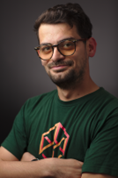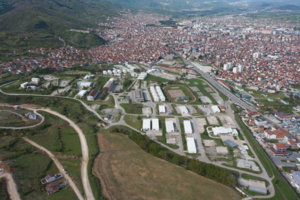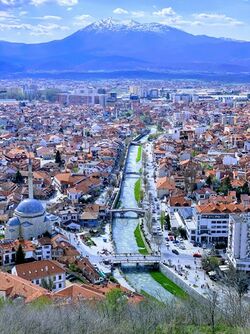State of the Map 2023/Call for venues/Prizren
FLOSSK and OpenStreetMap Kosovo are thrilled to apply for this bid on hosting SoTM next year! While this year we organized DebConf22 in Kosovo, and by knowing the importance and lack of international conferences in Kosovo - we want to continue doing so in the following years. In 2023 we are hosting FOSS4G23 and we believe that hosting SoTM 2023 in Prizren will create a great momentum where we bring communities together, while keeping lower costs for attendees and parallelly running the scholarship programme. Besides FLOSSK core team, 6 LoC professionals are engaged in planning and hosting SoTM2023.
With a long experience in organizing conferences, FLOSSK is very happy to bid for SotM 2023.
About FLOSSK
Free Libre Open Source Software Kosova (FLOSSK) is a non-governmental organization based in Prishtina, Kosovo, established in 2009 to support, promote and develop free and open-source software.
FLOSSK also contributes to open and participatory knowledge, education in information technologies through open courseware, and open standards, culture, and open society using open communication.
FLOSSK is a membership-based organization run by a three-member executive board. FLOSSK is an OSM Foundation chapter in Kosovo. We have already won the right to host FOSS4G 2023 and alongside it we would like to host the State of the Map Conference and HOT Summit.
Following the organization of the Debian Conference in 2022 in Kosovo, we want to continue this line of bringing international conferences to Kosovo. By hosting SotM we want to bring the spirit of the Open Source geo-spatial data community to Kosovo and the Southeast European region by focusing on the business part as well as the community engagement and networking side. Our goal during the conference is to have as much space for knowledge sharing, educational and professional development of participants as well as the promotion of best practices for development in education and research in the field of open source.
The importance of the ICT sector in Kosovo is a topic often discussed in Kosovo. ICT is seen as an attractive sector for economic growth, promoting export, creating jobs for the youth, return of the youth from the diaspora, and keeping young talents in Kosovo. SotM, without a doubt, will create momentum for ICT companies to take the opportunity of this event to promote their business to the world.
A successful SotM would create a healthy economical collaboration of the private and public sectors while affordable event costs will allow bigger participation coupled with the private and public sponsorships.
As financial performance is an important aspect of the conference, FLOSSK will ensure full transparency for all financial activities. Following the many years of experience in organizing local and regional conferences, FLOSSK will prepare and continuously control the budget and produce regular reports reviewing the quality and cost of purchased services and materials while SotM will be able to monitor all budget processes transparently at any time during the whole organizing period.
Based on its experience and already made partnerships, FLOSSK will negotiate the best contracts on the market with vendors and realize immediate upfront cost savings by procuring items, services, and contracts at the best price available. The main benefits of this effective procurement optimization are financial. Please see the budget section for further details.
Team
FLOSSK has a long experience in organizing conferences, starting with Software Freedom Kosova in 2009. Software Freedom Kosova is an annual international conference held in Kosovo organized to promote Free/Libre and open-source software, free culture, and an open society. Every year, SFK brings together developers and software users, artists, entrepreneurs, and leaders to collaborate, learn and share common interests in the field of open technology through a combination of lectures, training, and workshops.
FLOSSK has also organized the State of the Map Southeastern Europe 2019 conference. State of the Map Southeastern Europe was a three-day conference held at the Innovation and Training Park in Prizren which brought together stakeholders in the OpenStreetMap and Geographic Information Systems (GIS) ecosystem. Around 150 mappers, software developers, academicians, NGOs, business leaders, and users of OpenStreetMap from the US and Europe came together to create opportunities for knowledge exchange, networking, and partnerships.
The conference chair will be Besfort Guri, a FLOSSK member since 2009 as well as the Member of the Executive Board at FLOSSK.
Besfort leads OSGeo and OSM local chapters in Kosovo. Besfort was part of the organizing team of different conferences such as Software Freedom Kosova for several years, as well as State of the Map Southeast Europe in 2019, and Debconf22 held in Prizren.
He is in the FOSS4G 2022 organizing committee, as well as in the canceled FOSS4G 2021 Europe. He runs a small company focused on Geographical Information System and Web Development.
besfort.guri@flossk.org +38349877575
Arianit Dobroshi is President of the Executive Board at FLOSSK. He’s been with FLOSSK since 2009 involved in the organization of numerous annual Software Freedom Kosova conferences. Arianit is a Member of the Board at Wikimedians of Albanian Language User Group and an OpenStreetMap contributor since 2009. He engages in FLOSS public policy formation in Kosovo.
Enkelena Haxhiu is an embedded systems software engineer at Solaborate, working on the Linux Kernel. Enkelena was the DebConf22 lead organizer. She is a FOSS enthusiast and a Board member at FLOSSK. She studies Computed Automation and Robotics at the University of Prishtina.
Valmir Mustafa works as a project manager at FLOSSK. Since 2010, Valmir has been highly involved in organizing local and international conferences such as Software Freedom Kosova, State of the Map Southeast Europe, DebConf22, and now is part of the FOSS4G LoC.
Edonis Hashani is a Project Assistant at FLOSSK. He studied Computer Science and works on projects on cyberspace, digitalization, and the impact of technology on our lifestyles. He has experience in program development and management with non-governmental organizations. Edonis was part of the Debconf22 organizing team and is part of the FOSS4G LoC.
Qendresa Kastrati is Finance Manager at FLOSSK with over 8 years of experience in finance, accounting, procurement, and administration of NGOs, corporations, and medium and individual businesses. She has managed budgets up to 5 million EUR.
Sidorela Uku has a degree in Software Engineering. Currently works as a QA Engineer and Website developer. She is a member of Open Labs Hackerspace in Albania and contributor on various open source projects like OpenStreetMap, Wikimedia and LibreOffice. Co-organizer of Open Source Conference Albania (OSCAL) for 2018, 2019, 2022 editions. Sidorela is part of the State of the Map Program Committee and has participated in various events with presentations about OSM.
Gresa Neziri is a young researcher, with a background in architecture and a specialization in urban planning and management. She focuses on analyzing human behavior by tracing its spatial patterns. Equipped with Geo-Information Science and Earth Observation techniques as tools to analyze intra-urban socio-spatial patterns and design sustainable just cities. Gresa is the Executive Director and co-founder of SpaceSyntaKs, a research institute, based in Prishtina, whose main work consists of conducting human-centered research to deepen the understanding of the relation of urban phenomena with their socio-economic conditions. Gresa has been actively involved for more than five years in spatial planning documents in Kosovo, focusing on housing and settlement development.
Raymond Nijssen works as a freelance open source GIS consultant. He is an active member of the QGIS community and chair of the Dutch QGIS user group. He has attended FOSS4G conferences since Barcelona (2010) and participated in organizing FOSS4G events in The Netherlands.
Lucas De Oto graduated as a geographer and lecturer in geography from the University of El Salvador in Buenos Aires, Argentina. He received his MSc degree in Geo-Information for Natural Resources Management at ITC, University of Twente, The Netherlands. In Argentina, he worked both as a consultant geographer and GIS specialist for various ministries and other governmental agencies, notably the National Institute of Geography and the National Institute of Statistics and Censuses. He also collaborated as an adjunct researcher with the National Scientific and Technical Research Council (CONICET) and the Pedagogical University of Buenos Aires (UNIPE). In 2017 he joined the University of Twente where he teaches and coordinates different modules of the master's program and other courses at the Faculty of Geo-information Science and Earth Observation (ITC). He also collaborates in the development of didactic material, organization, and delivery of international trainings as part of capacity development efforts of the faculty. His current research focuses on the use of machine learning for geographical regionalization purposes.
Jonathan Beliën is a developer with 20 years of experience in web development and Geographic Information Systems (GIS). He supports the open-source movement by using, developing, and promoting open-source solutions and open-data in the organization he works for but also by being a member of the boards of OpenStreetMap Belgium and Open Knowledge Belgium.
Nysret Gashi has long experience with intercultural teams in the region and East Africa. He has worked with people from different backgrounds in partnership and in teams to successfully implement various projects on land management, cadastre and geodesy, LIS, GIS, on digitizing and vectorizing cadastral maps, topo maps, land use maps and other thematic maps.
Venue
The conference will be held at Innovation & Training Park (ITP) Prizren.
ITP Prizren is a business park located in a suburb of the city of Prizren. The area of 39 hectares offers a networking atmosphere that builds on collaboration and shared resources. ITP benefits traditional economic sectors by acting as a center for the distribution of innovative technologies.
The buildings in the area include 23 accommodation houses, administrative buildings, maintenance buildings, workshop sheds, a sports facility, recreational facilities such as cafes, and a modern canteen.
Address:
Innovation and Training Park (ITP)
Ukë Bytyçi St.
20000 Prizren,
Kosovo
In 2019 at this venue we hosted the SoTM SEE and DebConf in 2022 and the feedback was largely positive.
Rooms include the main conference hall with a 680m2, two secondary conference halls with 150m2, 2 workshops rooms with approx. 45 m2, front desk and other venues based on the summit’s needs.
The venue has rooms for workshops which can accommodate around 50 people to work properly (enough space and facilities included). We will also include catering and refreshments during the workshops. We can use the big rooms for the opening and closing plenary of the conference which can accommodate around 800 people. The parallel tracks for presentations during the conference can be held in 4 rooms.
The venue has up to three specific rooms that we can use for small business meetings. There are facilities used by other organizations on the “ITP campus” including “Prizren Makerspace”, “Autostrada Biennale”, and “ITP” Offices.
There are over 20 hotels in Prizren that can be used for the accommodation of participants. Rooms per night range from 25-60 EUR including breakfast. In addition, guesthouses, B&B, and hostels are available at 12-25 EUR. Innovation and Training Park in Prizren also has accommodation available on campus, with 100 rooms accommodating 1 or 2 persons at 30 EUR per room.
Regarding the size of the venue, this event can be limited only by the physical capabilities of the chosen building. The plenary will be held at the Main Conference Hall at the Innovation Training Park which has a maximum capacity of 680 people - for the parallel tracks, at the Second Conference hall we can accommodate over 350 participants.
Regarding the Gala Dinner, the limit is 1000 participants due to the size of the halls for these events, and for other social nights, we can accommodate up to 500 people while using pubs both outside and inside the venue.
Since the venue was formerly built and used as a military camp base, not all of it is infrastructurally accessible for individuals using wheelchairs or people with vision problems, nevertheless, ITP is working on making it more accessible. The Main Conference Room is on the ground floor and is accessible to everyone. Additionally, workshop and parallel session rooms are also accessible to everyone. Because of their own needs, the Innovation and Training Park Prizren is working on fixing these issues this year.
Catering
There is a local Restaurant Pizzeria located at the Venue Camp, with whom we will create an agreement for catering needs. The Restaurant has experience providing catering services for hundreds of people and has experience with conference-type catering. We engaged them in two (2) of our conferences we held at ITP: in 2019 (SotMSEE) and in 2022 (DebConf22).
City
The Republic of Kosovo lies at the center of the Balkans and is a developing country experiencing solid economic growth over the last decade.
The borders of Kosovo are largely mountainous, characterized by sharp peaks and narrow valleys. More than 50% of Kosovo’s territory is covered by forests and mountains, thus offering amazing hiking trails and beautiful rivers to enjoy. Besides the beautiful mountains and ancient ruins, Kosovo is known for its people’s hospitality. The capital city of Kosovo is Prishtina, which is known for its nightlife, its cafe culture, festivals, and cultural events, with the buzz that comes from Europe’s youngest population.
Set in the foothills of the Sharr Mountains, Prizren was once a capital city, being a large cultural and trading center. The town has always been one of Kosovo’s most beautiful cities, with unique roads, churches, mosques, and lots of old houses, which now serve for visual storytelling on the city's history and tradition.
The city has carefully maintained its influence from the Ottoman Empire while also adopting architecture from the west, so it gives the sensation of a mixed culture. Prizren is home to one of the best international documentary film festivals, Dokufest, which takes place in early August.
In Prizren, summers are warm and mostly clear.
If you’re planning to do a bit of tourism in Kosovo before or after the summit, we would suggest checking: Kosovo on Wikivoyage, Kosovo Tour Guide's Page and Hiking in Kosovo on Wikipedia] for inspiration. Here you can also see the day trip schedule we organized during Debfon22 this year.
- Is it a LGBT friendly space?
Summer festivals and international events in Prizren are usually very safe and inclusive towards many groups, such as the LGBTIQ+ community. Women can travel alone and there aren’t any specific laws against the LGBTIQ+ community. Nevertheless, there is a level of sexism and homophobia among some, accompanied by verbal harassment.
- What about medical and travel safety?
Kosovo’s medical system is lacking. However, even foreigners can get care, including emergency care, for a handful of euros. Private clinics are also numerous but at a higher cost. Kosovo is a safe country to travel and foreigners are much appreciated and helped. Crimes against tourists common in popular tourist destinations are not common in Kosovo.
- What about terrorism or criminalism?
The risk of terrorist attacks in the Kosovo over the past years can be classified as almost insignificant. Kosovo is mostly safe to visit. Violent crime exists but is mostly related to organized crime, and most dangers are of petty nature and between persons familiar to each other. Ethnic tensions might be present, limited in the northern corner of the country.
Travel/Transportation
- What travel infrastructure does it provide?
All international flights to Kosovo arrive at the Prishtina International Airport. From Prishtina International Airport there is a Public transport bus line from Prishtina International Airport to the Bus Station in Prishtina. Bus lines from Prishtina Bus Station to Prizren travel every 20 minutes (4 EUR).
Kosovo has border points with Albania, North Macedonia and Montenegro, which may be used to enter the country. Other than Prishtina International Airport, for cost considerations, participants can also use 3 other airports in the region which offer better priced airline tickets from some destinacions and especially if you are doing some tourism before or after arriving in Kosovo:
From Tirana International Airport is 2:10 hrs by bus (163 km) away. Tirana - Prishtina bus stops by Tirana International Airport with a stopover in the periphery of Prizren, from which you may call a taxi.
From Skopje International Airport might also have better deals through Wizz Air and alternative destinations from those in Prishtina. It will take 3-4 hrs all if best connected.
From Kukës International Airport is a newly opened airport, in northern Albania, across the border from Prizren, with a handful of lines, currently only serving Switzerland, mostly through charter lines. Get to the town of Kukës, from there vans (furgon) are regular to Prizren.
- What kind of visa restrictions are there?
Kosovo requires visas for citizens of certain countries. You can find more information on which participants will need a visa to come to Kosovo on Wikipedia.
Other special features of the venue
The venue is an enclosed campus with a high level of security. It is suitable and safe for families, those that might want to travel by car and has outdoor sports facilities. It’s quiet - as it is secluded from the city.
Live feed
We will live-stream the conference, allowing attendees who do not physically attend to participate.


